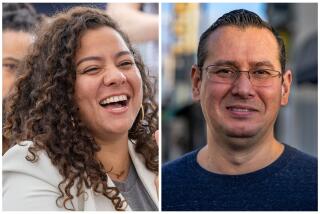Prosecutors Unable to Link Nolan to Reagan Signature Forgery Case
- Share via
SACRAMENTO — State prosecutors sought to indict former Assembly Republican Leader Pat Nolan in connection with the forgery of former President Ronald Reagan’s signature on campaign letters but decided after presenting the case to a grand jury that they could not prove that Nolan had committed a crime, according to a deputy attorney general in charge of the case.
Instead, Atty. Gen. John K. Van de Kamp obtained an indictment only charging Assemblyman John R. Lewis (R-Orange) with a single count of forgery in connection with the letters, which were sent to several hundred thousand California voters in 1986.
“We had gone in (to the Sacramento County Grand Jury) looking to obtain an indictment against both Assemblyman Lewis and Assemblyman Nolan,” W. Scott Thorpe, the supervising deputy attorney general, said in an interview. “But after evaluating all the evidence, we just determined that there was insufficient evidence to indict anyone but Lewis.”
Thorpe declined to provide further details of the Justice Department’s strategy in the case, but his comments shed new light on a 350-page transcript of the grand jury’s proceedings that was unsealed Friday. The transcript shows repeated attempts by Thorpe and co-prosecutor John A. Gordnier to place Nolan in the chain of events that led to the mailing of as many as 480,000 of the phony endorsements in six Assembly races.
Ultimately, however, no witness linked Nolan directly to the order to send the letters without White House authorization.
Nolan, of Glendale, who resigned as Assembly GOP leader in November, could not be reached for comment.
Thorpe told the grand jury in his opening statement Feb. 1 that at least two assemblymen--Nolan and Lewis--”knew prior to the letters being distributed that there had been no authorization from the President or the White House or the Republican National Committee.” He asked the jury to consider charging Nolan and Lewis with forgery and conspiracy.
The prosecutors called nine witnesses, including two Republican aides, Henry Olsen and Richard Temple, and a GOP consultant, Tim Macy, who were directly involved either in seeking White House approval for the letters or mailing them to voters. All three said they conferred regularly with Nolan and Lewis.
Lewis was implicated by both Olsen and Macy, and all three operatives testified that Nolan told them to lie to the White House to protect him from embarrassment after the phony endorsements were exposed. But no witness provided firsthand knowledge of Nolan giving the directive to mail the letters without White House consent.
Macy testified that Lewis told him that “they were debating whether they were going (to) ask for approval or not.”
“Did he define who ‘they’ was?” Macy was asked.
“The Assembly Republican leadership,” Macy answered. “The handful of people that Assemblyman Nolan would have around him helping making those decisions in the campaigns.”
The Republicans did submit drafts of their letters for approval, but the White House rejected them in mid-October, Olsen said. The President’s aides suggested instead that the Californians use generic, “fill-in-the-blank” letters that could be adapted for any candidate. Even these were supposed to be returned to the White House for final approval before being mailed.
When he told Lewis of the White House rejection, Olsen said, Lewis told him the unauthorized letters would “probably go out anyway.”
Macy said the order to send the letters was given to him by Lewis in a long-distance telephone conversation Oct. 24. Macy, in Sacramento, called Lewis, who was at a GOP leadership meeting in the Fullerton district office of Assemblyman Ross Johnson (R-La Habra), and asked if the letters should be mailed, he testified.
Lewis put him on hold, conferred with the other lawmakers and returned to the phone to give the go-ahead, Macy said.
“They wanted the letters mailed,” Macy said.
Nolan told him later that he was at the meeting, and that Assemblyman Dennis Brown (R-Los Alamitos) also attended, Macy testified. He said Lewis told him Johnson was there. None of the lawmakers was asked to testify before the grand jury.
Thorpe said Nolan and Lewis were not called because they were targets of the probe. Brown was not asked to testify because he had exercised his 5th Amendment rights against self-incrimination.
Johnson was interviewed by prosecutors, who determined that his recollection of the meeting was too weak to add anything to the case.
That left Macy’s account of the telephone conversation with Lewis as the only evidence implicating a legislator in the decision.
Testimony such as the following was typical of how prosecutors repeatedly fell short in their effort to prove that Nolan was connected to the scheme:
Macy said Nolan was aware that the letters mailed by the Republicans were not the generic forms received from the White House.
“So he knew that that was (a) different set of letters, that they were not the same. Is that correct?” Thorpe asked.
“Correct,” Macy replied.
But he could not say whether Nolan knew this before the election.
“I don’t remember,” he said.
More to Read
Get the L.A. Times Politics newsletter
Deeply reported insights into legislation, politics and policy from Sacramento, Washington and beyond. In your inbox twice per week.
You may occasionally receive promotional content from the Los Angeles Times.










